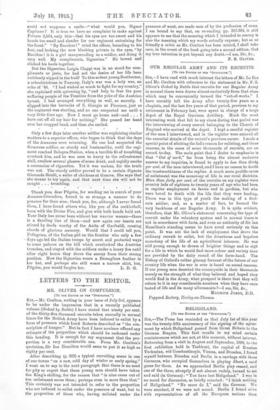OUR REGULAR ARMY AND ITS RECRUITS.
rTo THE EDITOR OF THE "SPECTATOR."] Silt, —I have read with much interest the letters of Mr. Le Batt and Mr. Coulton with reference to the statement in Mr. F. S. Oliver's Ordeal by Battle that recruits for our Regular Army iu normal times were drawn almost exclusively from that class which may be conveniently termed the "out-of-works." I have recently left the Army after twenty-five years as a chaplain, and the last five years of that period, previous to my retirement in February last, were spent in charge of a large depot of the Royal Garrison Artillery. Much the most interesting work that fell to my share during that period was the interviewing of every recruit belonging to the Church of England who arrived at the depot. I kept a careful register of the men I interviewed, and in the register were entered all the essential details of the recruit's previous career. I made a special point of eliciting the lad's reason for enlisting, and these reasons, in the cases of some thousands of recruits, are on record to-day. The main point that I desire to emphasize is that " Out of work," far from being the almost exclusive answer to my inquiries, is found to apply to less than thirty per cent, of the men interviewed, and I have no reason to doubt the trustworthiness of the replies. A much more prolific cause of enlistment was the monotony of life in our rural districts. More than forty per cent. of the recruits on my register were country lads of eighteen to twenty years of ago who had been in regular employment on farms and in gardens, but who were bored to death with the life that they were leading. There was in this type of youth the making of a first- rate soldier, and, as a matter of fact, he formed the very backbone of our Regular Army. It is quite evident, therefore, that Mr. Oliver's statement concerning the type of recruit under the voluntary system and in normal times is not in accordance with facts, and even an authority of Sir Ian Hamilton's standing seems to have erred seriously on this point. It was not the lack of employment that drove the ordinary recruit to enlist, but the dreariness and hopeless monotony of the life of an agricultural labourer. He was still young enough to dream of brighter things and to sigh for a life in which he would find more colour and variety than are provided by the daily round of the farm-hand. The Bishop of Oxford's rather gloomy forecast of the future of our country life when the war is over is based on sound reasons. If our young men deserted the countryside in their thousands merely on the strength of what they believed and hoped they would find in the Army, what prospect is there that they will return to it in any considerable numbers when they have once tasted of life and its many allurements P—I am, Sir, &e.,


































 Previous page
Previous page